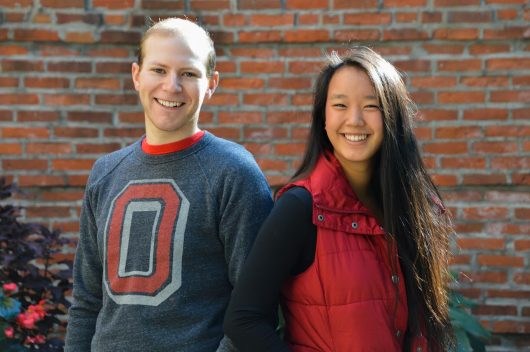
Andrew Jackson and Sophie Chang were elected as president and vice president of Undergraduate Student Government for the 2017-18 school year. Credit: Courtesy of Andrew Jackson and Sophie Chang
As their swearing-in date of April 4 approaches, newly elected Undergraduate Student Government president Andrew Jackson and vice president Sophie Chang are mapping out their administration’s ambitions and aspirations in the coming weeks.
Jackson, a third-year in Spanish and political science, and Chang, a third-year in environment, economy, development and sustainability, will be meeting with current USG president Gerard Basalla, a fourth-year in political science and strategic communication, and vice president Danielle Di Scala, a fourth-year in political science, to discuss transition plans for continuing the current administration’s work.
“From there, that’s when we start talking about what needs to be finished,” Jackson said. “We really want to make sure that we’re meeting with (Basalla) and (Di Scala) to ensure that what they’ve worked on gets implemented and continued. We want to push what they’ve done further.”
While their core policy has remained untouched since the election, Jackson and Chang said they’re open to expanding or changing their platform.
“As we have our transition meetings with the general assembly, and the administrators too, we’ll find out new information, and as we do that policy will evolve and it also depends on what the senators and directors will want to accomplish,” Chang said.
In terms of continuing policies, Jackson and Chang said they want all instructors to include the mental-health statement on their syllabi.
In November, the University Senate passed a resolution created by USG to provide an example statement with OSU’s mental-health resources for instructors to put on their syllabi. While the statement is provided to all instructors, it’s not required to be put on syllabi.
“Right now, that’s not currently being enforced,” Chang said. “But that’s not saying that we want to come up with an enforcement system, but we want to make sure that all faculty are aware of it.”
Chang and Jackson also have college affordability in their sights, in the form of attempting to cut the cost of textbooks and open up more online-textbook access codes.
“What we really need to do is push further in working with administrators and professors to eliminate access codes, which is one of the main issues that students have talked to us about,” Jackson said. “We will be working with administrators to find that balance with teachers, so we don’t have to pay $150 to $200 for a textbook and also pay for the access codes.”
Jackson and Chang also said they want to have input on the current plans underway in which companies are bidding for a contract to privatize the management of OSU’s energy systems, saying that sustainability should be on the forefront of negotiations with companies. University President Michael Drake recently told a local NPR affiliate that OSU wouldn’t commit to a bid unless certain energy standards were met.
“The main concern with that is the deal would be privatizing energy for the next 50 years and, right now, the face of energy is changing,” Chang said. “We know that it’s not going to be just coal and natural gas for the next 50 years. We want to make sure that anything we are committing ourselves to financially and environmentally is going to be sustainable and affordable for students, because going into the future in the next 25 years, it may very well be that renewable energy is more affordable than coal or natural gas.”


